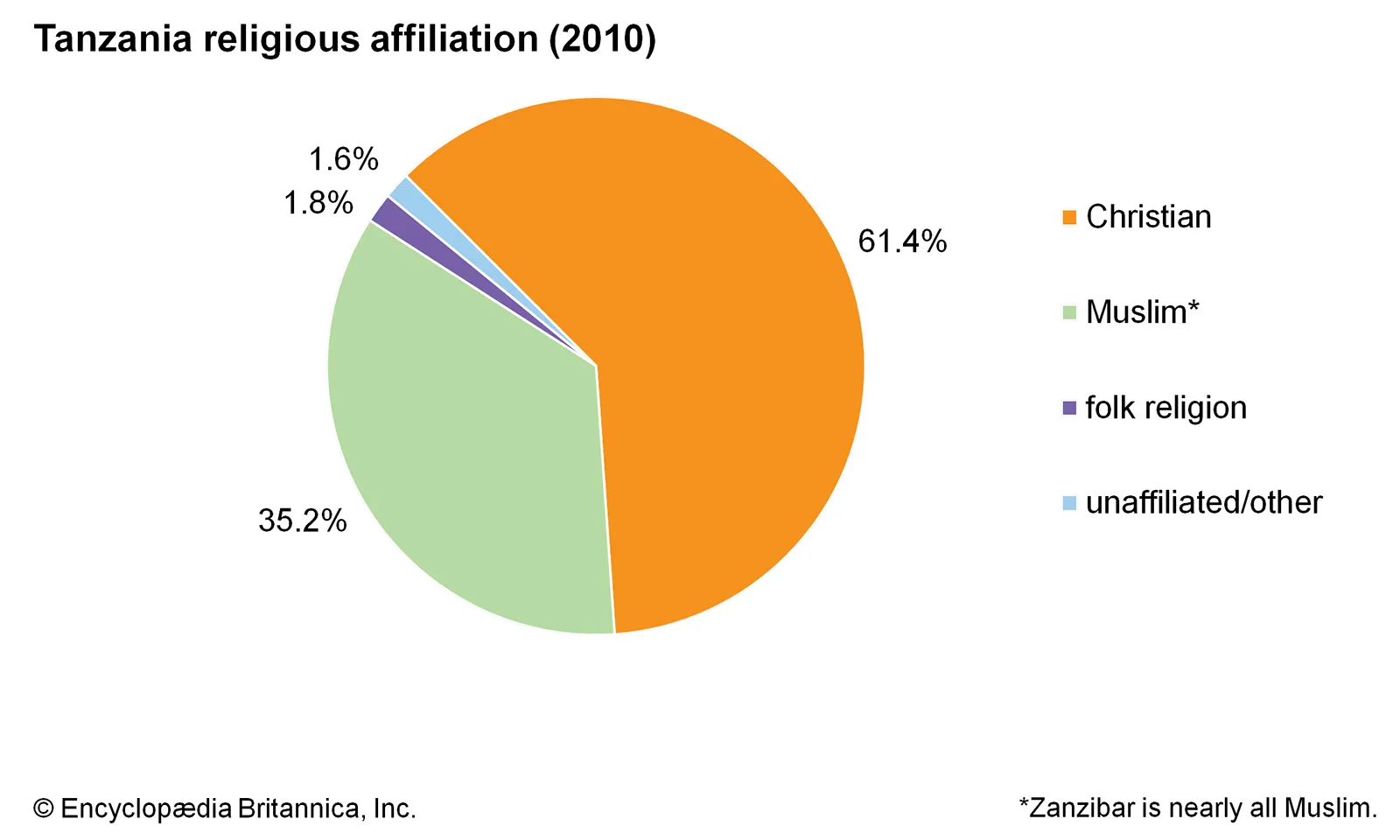With an eclectic mix of cultures, Tanzania presents an intriguing tapestry of beliefs. Christianity stands out as the predominant religion in this diverse nation. Historical waves of missionaries during the 19th and early 20th centuries contributed significantly to this dominance.
Christianity accounts for roughly two-thirds of the population, shaping both the cultural and spiritual landscape of Tanzania. This significant presence is reflected in the myriad of churches dotting the country, from urban centers to rural areas. Moreover, the religion’s impact is evident in social services, where church-run schools and hospitals play a crucial role.

Exploring the Predominant Religion in Tanzania
Christianity is the dominant religion in Tanzania, with around two-thirds of the population identifying as Christians. This influence is widespread, impacting various facets of daily life, from education to community gatherings. Churches play a central role in providing both spiritual guidance and social services. During holidays, towns and villages are often adorned with decorations, showcasing the vibrant religious culture. According to this post, Christianity’s roots have significantly shaped the nation’s cultural landscape.
Islam is also practiced by a substantial segment of the population, mainly along coastal regions and some inland areas. This religious diversity adds to the rich cultural fabric of Tanzania, fostering mutual respect among different faiths. Islamic holidays like Eid are marked by communal prayers and festive meals, enjoyed by both Muslims and their Christian neighbors. The spirit of togetherness underscores the nation’s creed of peaceful coexistence. Even in cities like Dar es Salaam, mosques stand next to churches, symbolizing unity.
Traditional African religions are still present, particularly within certain communities. These practices often focus on ancestral reverence and utilizing natural elements for rituals. Though less prominent now, these beliefs maintain a significant cultural importance. They are sometimes integrated with modern religious practices, showcasing a blend of old and new traditions. The respect for these ancient beliefs is strong among many Tanzanians.
The interplay between these religions fosters an environment of shared respect and understanding. Educational initiatives often emphasize this harmony, teaching young Tanzanians about the importance of interfaith dialogue. Cultural festivals and school programs regularly highlight this religious diversity. Through mutual respect, Tanzania has built a unique, inclusive society. It’s a model for how diverse beliefs can coexist peacefully.
Overview of Religious Demographics and Christian Dominance
In Tanzania, religious demographics highlight the prevalence of Christianity among its citizens. Approximately 63% of the population identify as Christians, making it the most followed religion in the country. This majority is divided mainly between Roman Catholics and various Protestant denominations. Each has a significant number of adherents, contributing to the country’s religious landscape. Churches serve as vital community centers, hosting events and providing social services.
Islam is another important religion, practiced by about 34% of Tanzanians. Primarily located in coastal areas like Zanzibar and Dar es Salaam, Islam plays a key role in the cultural traditions of these regions. Mosques are integral to the community, much like churches in predominantly Christian areas. This religious presence fosters a unique blend of cultural practices and influences. The mosque’s call to prayer is a pervasive sound in coastal towns.
Despite these major religions’ dominance, traditional African beliefs persist among certain groups. These faiths often center around nature and ancestor worship. They are more prevalent in rural areas, where these traditions have been preserved over generations. Many Tanzanians may incorporate aspects of these beliefs into their modern religious practices. It’s a testament to the enduring influence of indigenous culture.
The religious diversity in Tanzania showcases a model of peaceful coexistence. Interfaith dialogues and shared community initiatives help strengthen this harmony. Educational programs aim to highlight the value of religious tolerance and mutual respect. This diverse religious backdrop contributes to a rich, multicultural society. The nation’s strength lies in its ability to blend diverse beliefs harmoniously.
The Impact of Christianity on Tanzanian Society
Christianity has deeply influenced various aspects of Tanzanian society, especially in education. Many of the nation’s top schools are run by Christian organizations. These institutions provide quality education, which helps shape the future leaders of Tanzania. Scholarships and financial aid from churches also support students from low-income families. Education is a key tool for uplifting communities.
Healthcare is another significant area where Christianity has made an impact. Numerous hospitals and clinics in Tanzania are operated by church missions. These medical facilities often serve remote areas that might otherwise lack healthcare access. By offering crucial services, they make a tangible difference in people’s lives. The church’s commitment to health care ensures that even the less privileged receive necessary medical attention.
Beyond education and healthcare, Christianity influences social values and ethics. The church is often seen as a moral guide, teaching principles of honesty, integrity, and community support. These values strengthen social cohesion and help tackle social issues like corruption and inequality. Regular community outreach programs further foster mutual support among Tanzanians. This moral framework is crucial for societal stability.
Christian holidays and festivals also play a major role in Tanzanian culture. Events like Christmas and Easter are celebrated with great enthusiasm. During these times, people come together for prayers, feasts, and community activities. This sense of community and togetherness is vital for maintaining social harmony. Celebrations encapsulate the unity and shared values among Tanzanians.
Interfaith Relations and Cultural Harmony in Tanzania
Tanzania is a country where different faiths coexist peacefully. The majority of the population practices Christianity or Islam, but there are also communities that follow traditional African religions. This diversity contributes to a rich cultural tapestry. People of different religions often participate in each other’s festivals and celebrations. This inclusiveness fosters mutual respect and understanding.
Communication plays a crucial role in maintaining interfaith harmony. Regular dialogue between religious leaders helps to address any conflicts that arise. These discussions are often held in community centers or places of worship. By talking openly, leaders can find common ground. This proactive approach prevents small issues from escalating.
Education also supports religious tolerance in Tanzania. Schools teach about various religions, highlighting similarities and shared values. This approach helps to reduce prejudice among young people. Learning about different faiths fosters a sense of global citizenship. It’s a vital part of building a peaceful society.
Government policies promote religious equality, too. The government ensures that all religions have the freedom to practice their beliefs. Public events and holidays consider the diverse religious calendar. This inclusivity helps to maintain balance and fairness. It also strengthens national unity.
Interfaith organizations further support cultural harmony. These groups organize events that bring people of different religions together. Activities may include community service projects, interfaith dialogues, and cultural festivals. Such initiatives create opportunities for people to learn from one another. They highlight the positive impact of religious diversity.
Tanzania’s commitment to cultural harmony sets an example for other nations. By valuing each faith and encouraging open dialogue, the country has built a model of peaceful coexistence. This harmony enriches the social fabric, contributing to a stronger and more unified nation. Tanzanians take pride in their ability to live together amicably. It’s a testament to the power of respect and tolerance.
Key Takeaways
- Christianity is the main religion in Tanzania, followed by Islam.
- Approximately 63% of Tanzanians identify as Christians.
- Islam is practiced by about 34% of the population.
- Tanzania also has communities following traditional African religions.
- The country showcases significant religious diversity and harmony.

